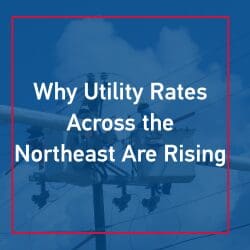When you’re managing one or multiple properties, unpredictable energy costs can derail even the best-planned budgets. Electricity and natural gas prices across the Northeast have seen historic volatility in recent years, making it harder than ever for property managers to forecast expenses and maintain stable operating costs.
While you can’t control the energy market, you can control how you buy energy and reduce exposure to cost spikes.
Why Energy Prices Fluctuate So Often
Energy cost swings in the Northeast tend to be higher than elsewhere in the US. Seasonal demand, natural gas pipeline constraints, global fuel supply, and regulatory changes all influence energy prices.
During cold snaps, electricity and gas demand spike simultaneously, forcing utilities and suppliers to compete for limited resources. Even short-term disruptions can drive up rates, leaving property budgets exposed.
That’s why many property managers who once relied on default utility rates or month-to-month supplier contracts are now re-evaluating their approach. The goal isn’t just to find the lowest price, it’s to build stability into the way you purchase energy.
Locking In Predictability with Fixed-Rate Contracts
One of the most effective ways to protect your budget from market spikes is through a fixed-rate energy contract. Instead of watching prices rise and fall throughout the year, or working with an unfavorable utility rate, you secure one rate for the length of your agreement.
That stability helps you:
- Plan ahead with confidence – Know your costs for the year and forecast your operating budget accurately.
- Avoid sudden cost overruns – Market volatility doesn’t impact your locked-in rate.
- Simplify reporting – Predictable costs make expense tracking easier across multiple properties.
For many property managers, especially those overseeing multi-tenant or mixed-use buildings, fixed pricing turns unpredictable costs into a manageable line item.

Balancing Flexibility and Stability
Every property portfolio is different. You may manage buildings with varying usage patterns, occupancy levels, or energy sources. That’s where flexible contract structures come in.
Some businesses choose a fully fixed rate for maximum budget protection, while others prefer a blended model that allows partial exposure to market prices when conditions are favorable.
The right contract type depends on your goals, risk tolerance, and long-term strategy — and having clear visibility into how those options work can help you make better decisions.
Prioritizing Transparency
One of the biggest challenges for property managers is understanding what’s actually included in an energy contract. Hidden fees, confusing pass-through charges, or unclear renewal terms can all lead to surprises on your bill.
Before signing an agreement, make sure your supplier clearly explains what’s fixed, what’s variable, and what could change over time. The best partners will provide straightforward documentation, plain-language billing, and proactive communication about your plan.

Finding the Right Partner
Working with a supplier who understands your business can make all the difference. Look for a team that provides regional market expertise, transparent pricing, and reliable account support. A knowledgeable energy partner can help you navigate market conditions, evaluate timing, and secure a rate that works with your budget.
Partnering with Sprague
Sprague has more than 150 years of experience helping businesses across the Northeast make informed energy decisions. Our team monitors market trends daily and works closely with property managers to create customized energy purchasing plans that balance stability and flexibility.
If you’d like to review your current agreement or better understand your options for managing energy costs, our specialists can help you find a pricing plan that supports your goals and your budget. Get a free quote for your energy needs here.










